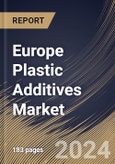In the automotive sector, where lightweight and durable materials are essential, plastic additives play a crucial role. Flame retardants, impact modifiers, and lubricants are incorporated to meet stringent safety standards and improve the overall performance of automotive components. The drive towards electric vehicles and the need for fuel efficiency have further heightened the demand for lightweight yet robust plastic materials.
Moreover, it has extensive applications in the construction industry, contributing to the development of weather-resistant, insulating, and aesthetically appealing building materials. Additives such as plasticizers and flame retardants are utilized in producing pipes, cables, roofing materials, and insulation, enhancing the durability and safety of construction products. Likewise, the healthcare sector has witnessed an increasing integration of plastic materials and, consequently, plastic additives. Medical devices, packaging for pharmaceuticals, and even certain types of implants utilize specialized plastic formulations with additives that ensure biocompatibility, sterilizability, and compliance with stringent regulatory standards.
Additionally, to increase fuel economy and comply with environmental regulations, the automotive industry in the United Kingdom is, like many others, concerned with reducing vehicle weight. Reinforced with additives such as fillers and reinforcements, plastic offers a lightweight alternative to traditional materials. The automotive industry in the United Kingdom is actively working towards reducing emissions and transitioning to electric vehicles. Plastics and plastic additives play a role in developing components for electric vehicles, such as battery casings and lightweight interior features, contributing to the overall sustainability of the automotive sector. As per the data from the UK Parliament, in 2022, the manufacture of motor vehicles and parts contributed £13.3 billion to the economy, 0.6% of the UK’s total output. Therefore, these factors will assist in the growth of the regional market.
The Germany market dominated the Europe Plastic Additives Market by Country in 2022 and would continue to be a dominant market till 2030; thereby, achieving a market value of $2,800 million by 2030. The UK market is exhibiting a CAGR of 3.5% during (2023 - 2030). Additionally, The France market would experience a CAGR of 5.3% during (2023 - 2030).
Based on Plastic Type, the market is segmented into High-Performance Plastics, Commodity Plastic, and Engineering Plastic. Based on Application, the market is segmented into Building & Construction, Packaging, Automotive, Consumer Goods, Agriculture, Electrical & Electronics, and Others. Based on Type, the market is segmented into Plasticizers, Flame Retardants, Impact Modifiers, Antioxidants, Lubricants, Antimicrobials, UV Stabilizers, and Others. Based on countries, the market is segmented into Germany, UK, France, Russia, Spain, Italy, and Rest of Europe.
List of Key Companies Profiled
- BASF SE
- Exxon Mobil Corporation
- Clariant AG
- Kaneka Corporation
- Lanxess AG
- The Dow Chemical Company
- Evonik Industries AG (RAG-Stiftung)
- Songwon Industrial Co., Ltd.
- Nouryon (Carlyle and GIC.)
- Albemarle Corporation
Market Report Segmentation
By Plastic Type (Volume, Kilo Tonnes, USD Billion, 2019-2023)- High-Performance Plastics
- Commodity Plastic
- Engineering Plastic
- Building & Construction
- Packaging
- Automotive
- Consumer Goods
- Agriculture
- Electrical & Electronics
- Others
- Plasticizers
- Flame Retardants
- Impact Modifiers
- Antioxidants
- Lubricants
- Antimicrobials
- UV Stabilizers
- Others
- Germany
- UK
- France
- Russia
- Spain
- Italy
- Rest of Europe
Table of Contents
Companies Mentioned
- BASF SE
- Exxon Mobil Corporation
- Clariant AG
- Kaneka Corporation
- Lanxess AG
- The Dow Chemical Company
- Evonik Industries AG (RAG-Stiftung)
- Songwon Industrial Co., Ltd.
- Nouryon (Carlyle and GIC.)
- Albemarle Corporation








